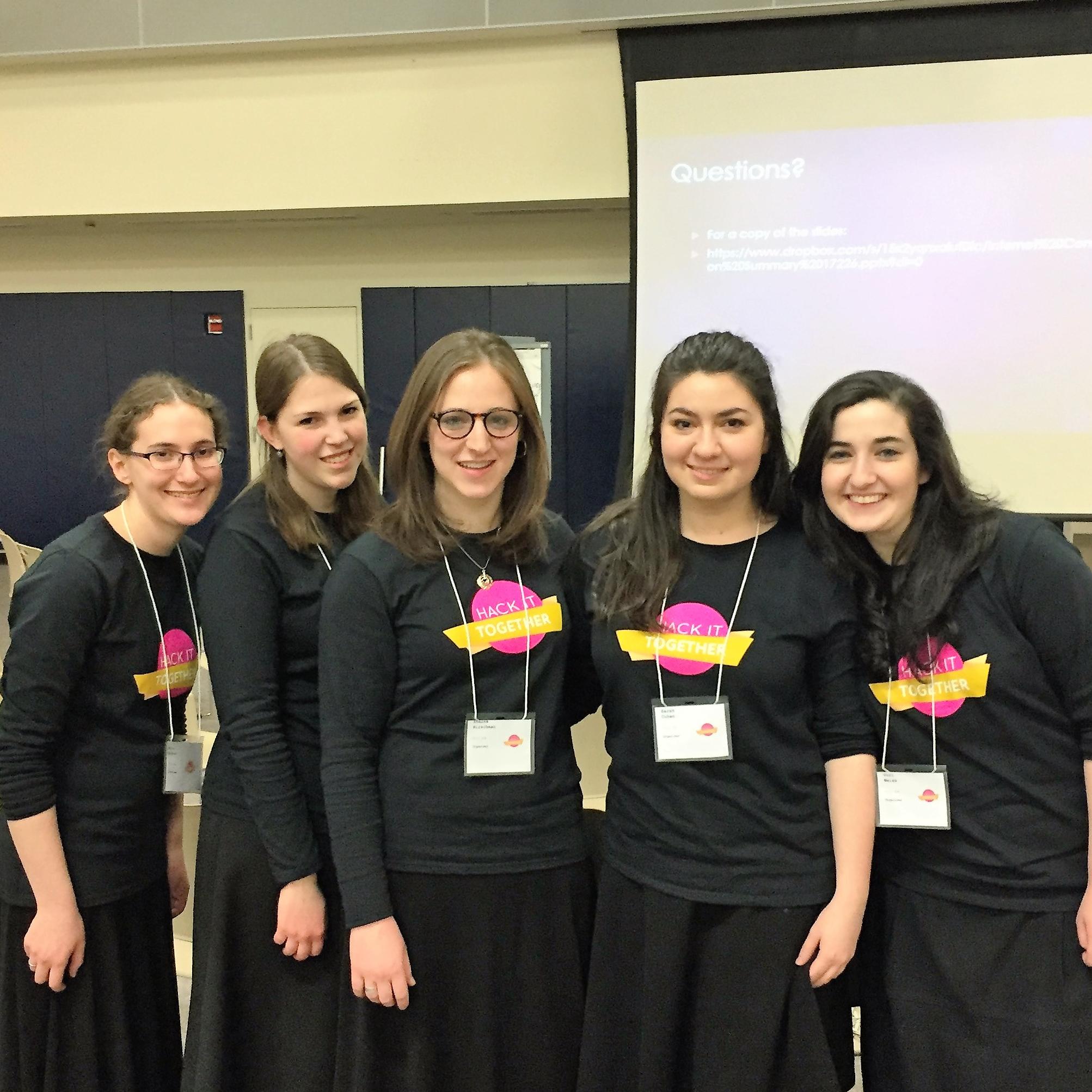Fighting Gender Disparity in Tech
Female Innovators Gather for 2nd Annual LCW Hackathon

Almost 100 participants, representing more than a dozen schools, from New York and New Jersey arrived early Sunday morning, February 24, to Lander College for Women—The Anna Ruth and Mark Hasten School (LCW) for one of the few, and possibly only, hackathons solely open to women.
Hack It Together, LCW’s second annual hackathon, challenged women — from high school to college — to collaborate and develop a software or hardware project in a twelve-hour time period. The event was co-hosted by Google IgniteCS, Touro College, LCW and IsraelTech Challenge. Additional sponsors for the event included Trello, Bloomberg and PluralSight.
By noon, there was a steady, friendly buzz emerging from the tables in the downstairs auditorium of the Upper West Side campus. Teams, which included students from NYU, Columbia, Rutgers University, several CUNY schools and Touro, spoke about their ideas: Food Connects, a food-sharing app, designed to allow neighbors to plan meals for homeless shelters; I’m Down a website that linked to a Google calendar with volunteering opportunities based on whether a user was free; BloodCare, a website that tracks blood type shortages in local hospitals; and The Back Stabilitator, a prototype for an automated scoliosis rod that would extend itself with a flex sensor, saving patients from invasive surgery. (View the complete list of projects and explanations.)
While ostensibly a competition with a grand prize of an Amazon Echo for the first place team members, organizer Shaina Hirschman stressed that the prizes weren’t the main draw of the event.
“The point isn’t to win,” said Hirschman, a senior at LCW. “The point is to have the experience. Women are at a disadvantage in technology, especially at the bro-hackathon culture. Women aren’t typically included in events like this and the Hack It Together hackathon is an opportunity to change that.”
Dean Marian Stoltz-Loike worked hard to help establish the event, but says it ultimately came down to the passion and commitment of her students.
“The success of the event was a testament to the dedication and talent of our students,” stated Dean Stoltz-Loike. “Students from colleges across New York took part in the hackathon. We even had some terrific high school students participate. We were thrilled to be able to host an event that nurtures these future female tech leaders.”
The other LCW organizers were students Sarah Cohen; Miriam Felsenthal, Aviva Kaufman, Rachel Elberger, Vori Weiss and Rachel Moskowitz.
Women in Tech
The statistics for women in computer-related occupations are bleak: after reaching a high of 36 percent in 1991, the percentage has decreased to 25 percent in 2016, despite women composing 56 percent of the workforce, according to the Bureau of Labor.
LCW students have experienced first-hand the gender disparity. One LCW student at the hackathon said that only 15 of the 125 interns were female at a tech-related Fortune 500 company where she spent her summer.
A table of CUNY students worked together to develop Lax, a chatbot that offered guided meditation to help lessen anxiety. Asked if there was a disparity in the tech world, they all readily agreed. Most noted that there were few, if any, other women in their classes.
Esther Kundin, a senior software engineer at Bloomberg and the co-chair of Bloomberg’s Women in Technology, was one of the mentors at the competition. She lamented the number of women in technology-related positions. “We live in a society that tells women not to reach their full potential,” she said. “I’ve very happy that LCW’s Hack It Together exists.”
A Hackathon for Religious Jews
Aside from the gender disparity, hackathons are especially difficult propositions for religious Jews given that most are held on Saturday.
“My students have been begging me to go to a hackathon,” explained Dr. Bryna Erblich, a teacher at Bruria High School, who brought several of her students to the event. “These events help develop a community of women in technology.”
“If you don’t meet people like you, you can’t picture yourself belonging in the world of tech,” said LCW alum and Hack It Together founder. “Women need to picture themselves at the top of the tech field; that will get them a step closer to being there.”
Workshops and Lectures
Participants who signed up were also able to join five free workshops on a variety of topics in coding and technology, including a lecture by the founder of The Coding Space in Manhattan and several employees from Google. Meals were provided during the hackathon and teams were able to take breaks and listen to lectures that ranged from the origin of the internet, to how to handle a first job interview.
Mori Berman, a first-year student at LCW, was working on a website that synched volunteering opportunities to a user’s Google-calendar. She was writing up some code in Java, a computer language she had just picked up.
“I didn’t have a team and we just joined up,” she said. “We’re all girls from different colleges and it works because we all know different things.”
The projects were judged based on the criteria of innovation, impact, technical achievement and scalability. The Back Stabilitator, created by the team from Bruriah High School, took first place; BloodCare came in second; and College Grabz, a site for college students to give away items ranging from food to books, was third.

